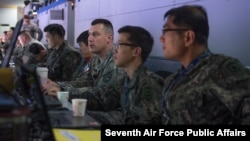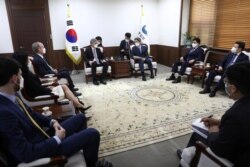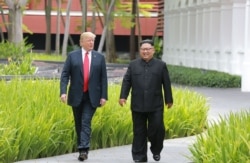North Korea has condemned U.S.-South Korea military exercises that begin this week, saying the drills show the need for Pyongyang to develop more of its own military capabilities.
The computer-simulated exercises are being scaled back amid the coronavirus pandemic and fears they could upset North Korea, which recently reopened communication hotlines with the South.
But no matter the size or form, North Korea views the military training as an act of aggression, Kim Yo Jong, the sister and adviser of North Korean leader Kim Jong Un, said Tuesday.
The drills, she said, exacerbate the "instable situation" on the Korean Peninsula, according to a statement published by the official Korean Central News Agency.
In order to cope with the "ever-growing military threats from the U.S.," North Korea will further advance its "national defense" and "powerful preemptive strike" capabilities, she added without elaborating.
Later Tuesday, South Korean officials said their afternoon calls to North Korea via two hotlines went unanswered, in an apparent protest of the exercises, according to South Korea's Yonhap news agency.
Over the past several weeks, North Korea has given mixed messages about its stance toward the U.S. and South Korea.
Mixed messages
Last month, the two Koreas announced that Kim Jong Un and South Korean President Moon Jae-in had recently exchanged letters. The two men also decided to reopen several inter-Korean hotlines as a first step toward improving relations.
Last month, the two Koreas announced that Kim Jong Un and South Korean President Moon Jae-in had recently exchanged letters. The two men also decided to reopen several inter-Korean hotlines as a first step toward improving relations.
The moves raised hopes North Korea was pivoting toward engagement, following nearly two years of refusing to talk with Washington or Seoul. But just days later, Pyongyang warned that the U.S.-South Korea military exercises could lead to tensions.
It's not a new strategy for North Korea, which has long tried to create rifts in the U.S.-South Korea alliance. As part of that strategy, North Korea often uses provocations and the promise of talks — often simultaneously.
In June, Kim Jong Un ordered his country to be prepared for both "dialogue and confrontation" with the United States.
Under U.S. President Joe Biden, officials have repeatedly said they are open to talks with North Korea. But both the U.S. and North Korea appear reluctant to make the first move.
Conflicting priorities for South
The situation is complicated for South Korea's President Moon, who has less than a year left in office.
By going ahead with the exercises, Moon risks upsetting chances for inter-Korean talks, which are a main priority of his left-leaning administration.
But Moon must hold the drills to advance another of his key goals: the transfer of wartime operational control of the South Korean military from the U.S. to South Korea.
The transfer is not supposed to take place unless numerous benchmarks are met, including South Korea's performance during military exercises.
Under the current arrangement, the U.S. would control the South Korean military if war broke out.
The U.S. has 28,500 troops in South Korea, a remnant of the 1950s-era Korean War, which ended in an armistice instead of a peace treaty.
Talks stalled
The U.S. and South Korea have repeatedly scaled back or canceled exercises during the coronavirus pandemic, as well as during the talks between Kim Jong Un and former U.S. President Donald Trump.
Trump and Kim met three times, including in June 2018, when they agreed to work toward the complete denuclearization of the Korean Peninsula.
Talks later broke down after the U.S. refused North Korea's offer to abandon part of its nuclear program in exchange for the U.S. relaxing most sanctions against Pyongyang.
Domestic problems
Since then, North Korea has threatened to resume longer-range missile launches or nuclear tests.
But more recently North Korea has been focused on domestic issues, such as major floods, a heat wave and the coronavirus.
North Korea continues to insist to the World Health Organization that it has detected no coronavirus infections.
In its latest report published this week, the WHO said North Korea has found zero infections among the 35,254 COVID-19 tests it has conducted.
A coronavirus outbreak could be devastating in North Korea, which is impoverished in many areas and has an uneven health system.








